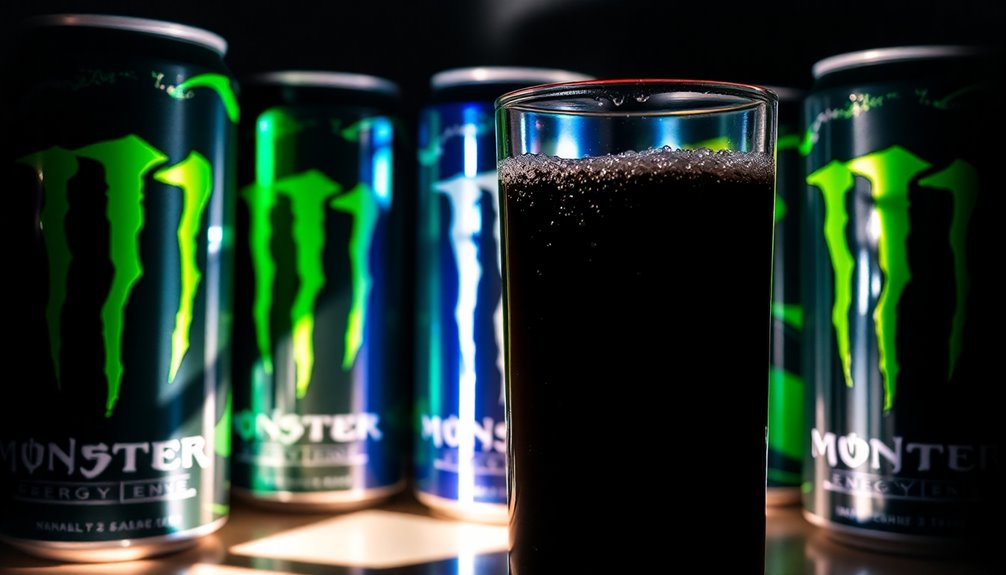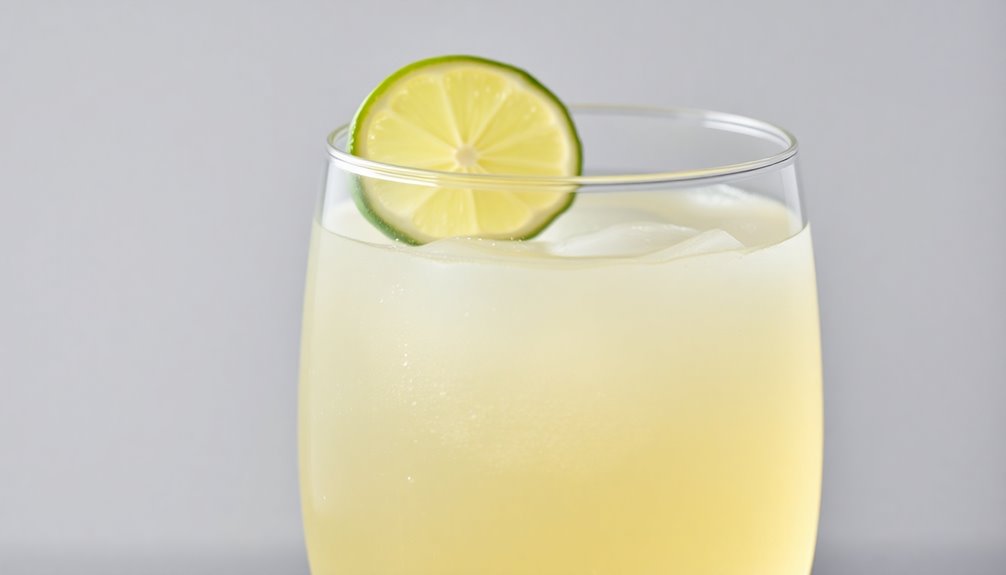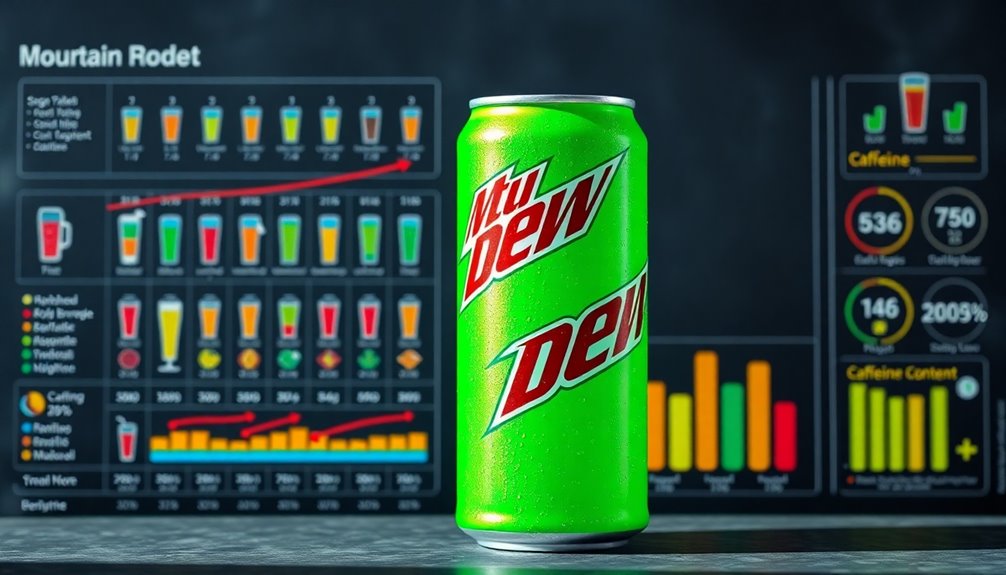Monster Energy drinks contain a hefty 150-170 mg of caffeine per 16 oz can, markedly more than the 100 mg found in an 8 oz cup of coffee. This high caffeine level can lead to health risks, like anxiety and elevated heart rates, especially if you're sensitive to it. With concerns about mislabeling and potential toxicity, it's essential to stay informed before grabbing a can. Plus, the combination of caffeine and sugar may lead to dependency. If you want to uncover more about the potential risks and explore healthier alternatives, there's plenty more to discuss.
Key Takeaways
- Monster Energy drinks contain 150-170 mg of caffeine per 16 oz can, significantly more than a typical cup of coffee.
- The original flavor has 166 mg of caffeine, exceeding the 100 mg found in an 8 oz cup of coffee.
- High caffeine consumption can lead to serious health risks, including anxiety, heart palpitations, and elevated blood pressure.
- Reports indicate that more than 20% of energy drinks may exceed their stated caffeine levels, raising safety concerns.
- The FDA has limited oversight on energy drinks, classifying them as supplements, which raises transparency issues regarding caffeine content.
Overview of Caffeine Content

When it comes to energy drinks, caffeine content plays a significant role in their appeal. Monster Energy packs a punch with 150-170 mg of caffeine per 16 oz can, particularly the original flavor boasting 166 mg. This caffeine concentration is especially higher than the roughly 100 mg found in an average 8 oz cup of coffee.
While you might crave that energy boost, it's important to take into account the potential health effects of excessive caffeine. Consuming multiple cans can lead to symptoms like anxiety and heart palpitations.
Additionally, many energy drinks lack transparency about their caffeine content, raising concerns about mislabeling. Ignoring these factors could lead to serious health consequences, so staying informed is essential.
Health Risks of High Caffeine
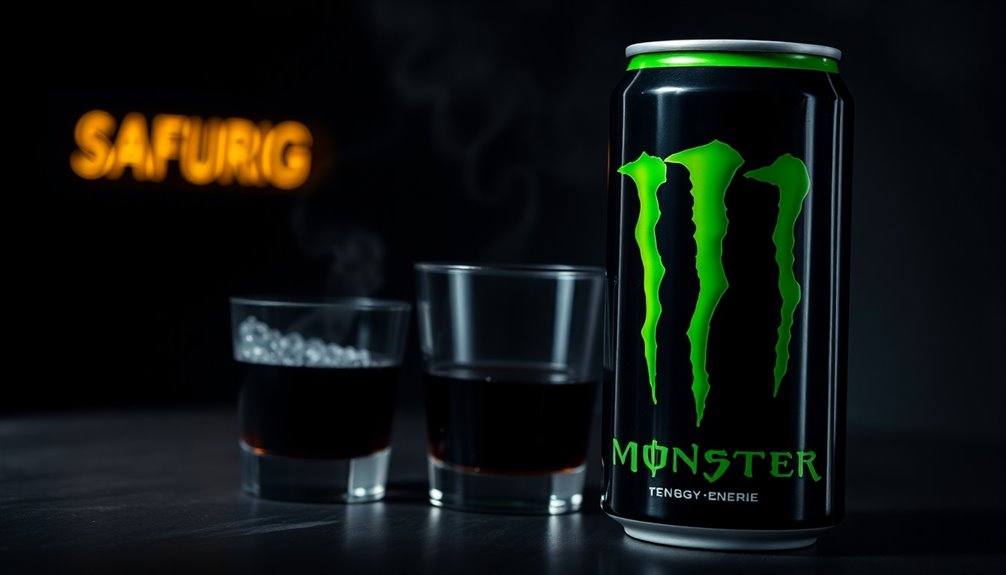
While enjoying a Monster Energy drink can provide a quick energy boost, it's crucial to recognize the potential health risks associated with high caffeine consumption.
With about 166 mg of caffeine per 16 oz can, these drinks can lead to caffeine toxicity, especially if you have preexisting heart conditions. Excessive intake can cause serious side effects like elevated blood pressure, anxiety, and heart palpitations.
If you exceed the recommended daily limit of 400 mg, you might experience insomnia, irritability, and mood swings. The combination of high caffeine and sugar can create dependency, resulting in withdrawal symptoms when you cut back.
Tragically, reports have linked at least five deaths to Monster Energy drinks, highlighting the severe health risks involved.
Monster Energy Ingredients

Understanding the ingredients in Monster Energy drinks can help you make informed choices about your energy boost. Each 16 oz can packs around 160-166 mg of caffeine, considerably higher than a standard cup of coffee.
Alongside caffeine, you'll find synthetic taurine, which may stress the heart, and L-Carnitine, known for converting fat into energy. The drink also features B vitamins and inositol, essential for metabolism.
However, be cautious of the high sugar content—approximately 54 grams per can—which can lead to blood sugar spikes and crashes. The inclusion of artificial flavors and additives raises health concerns, especially since research on their long-term effects is limited.
Always consider these ingredients when choosing Monster Energy for your energy needs.
Comparing Caffeine Sources
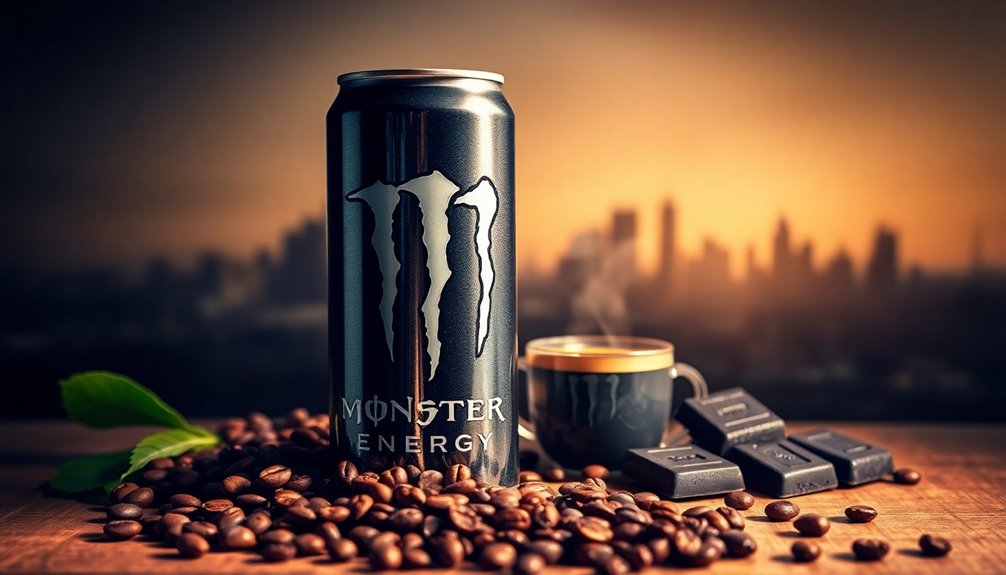
Caffeine sources vary widely, and knowing how they stack up can help you choose the right boost for your needs.
When you consider the amount of caffeine in different beverages, here's how they compare:
- Monster Energy drinks: Approximately 160 mg of caffeine per 16 oz can.
- Coffee: About 100 mg in an 8 oz cup.
- Espresso: Roughly 75 mg per shot, meaning Monster packs more than two shots.
- Vietnamese coffee: Can contain up to 130 mg, but still less than Monster.
If you're thinking about drinking Monster, keep in mind that the caffeine content is markedly higher than traditional options.
For those with a heart condition, it's vital to monitor your intake to avoid potential risks.
Consumer Safety Concerns

As the popularity of Monster Energy drinks rises, so do the consumer safety concerns surrounding their high caffeine content. Reports of five deaths linked to these drinks highlight the potential dangers of excessive caffeine consumption, especially among vulnerable groups like adolescents.
Symptoms of caffeine intoxication, including anxiety and heart palpitations, raise alarms about the safety of consuming two Monster Energy drinks in a short span. Additionally, investigations reveal misleading claims about caffeine content, with Consumer Reports finding that over 20% of the caffeine levels exceed what's stated on labels.
This discrepancy, combined with the FDA's lax oversight as these drinks are classified as supplements, amplifies consumer safety concerns and calls for more transparency in energy drink marketing.
Healthier Alternatives Available

While many rely on Monster Energy drinks for a quick boost, healthier alternatives are readily available that provide sustained energy without the drawbacks.
Wholesome Organics Clean Energy Shots are a great choice, as they offer:
- Natural caffeine that delivers steady energy.
- Zero added sugars, avoiding blood sugar spikes.
- Adaptogens like ashwagandha, enhancing mental clarity and reducing stress.
- Balanced caffeine levels, unlike Monster's high caffeine content.
Additionally, incorporating foods high in dietary fiber can further support energy levels and digestive health.
Making Informed Choices

When choosing energy drinks, it's crucial to understand where your caffeine is coming from.
Knowing the caffeine content can help you evaluate potential health risks and make smarter choices for your well-being.
Don't overlook the importance of being informed about what you consume.
Understanding Caffeine Sources
Understanding the sources of caffeine in energy drinks like Monster is essential for making informed choices about your consumption. The Monster Energy brand has varying caffeine levels, often around 160 mg of caffeine anhydrous per 16 oz can, considerably higher than coffee. Understanding the caffeine content in energy drinks is important for those who are sensitive to caffeine or have medical conditions that can be exacerbated by its consumption. It’s crucial to be aware of the potential effects of consuming high levels of caffeine, such as increased heart rate, anxiety, and insomnia. By knowing the specific caffeine content in energy drinks like Monster, individuals can make more informed decisions about their intake and monitor their overall caffeine consumption throughout the day.
Here are four key points to take into account:
- Caffeine Variability: Most Monster drinks range from 150-170 mg of caffeine per can.
- Misleading Labels: Studies show some drinks exceed listed caffeine levels.
- Sensitivity: People sensitive to caffeine should be cautious of these higher concentrations.
- Regulatory Scrutiny: There's increasing demand for accurate labeling to guarantee transparency regarding caffeine content. Additionally, consumers should be aware of the effects of caffeine on overall health and energy levels.
Evaluating Health Risks
As you consider the health risks associated with consuming Monster Energy drinks, it's crucial to recognize the significant caffeine content they contain. Each 16 oz can packs around 160 mg of caffeine, which is higher than an average cup of coffee.
Consuming more than two cans can exceed the recommended daily limit of 400 mg, leading to adverse effects like anxiety and heart palpitations. Reports of serious health issues, including five deaths, underline the dangers of high caffeine intake, especially for vulnerable groups like adolescents.
Long-term use can increase the risk of cardiovascular issues, disrupting heart rhythms and raising blood pressure. Additionally, the addictive nature of caffeine and sugar may create dependency, making it hard to reduce consumption. Understanding the importance of awareness about caffeine-related health risks can help individuals make informed choices.
Frequently Asked Questions
Is Monster Safer Than Red Bull?
When you compare Monster and Red Bull, neither is definitively safer.
Monster packs more caffeine and sugar, which can lead to higher health risks if you consume multiple servings.
Red Bull has less caffeine, but it still poses potential dangers.
Both drinks can cause issues like heart palpitations and anxiety with excessive intake.
It's vital to reflect on moderation when choosing between them to protect your health.
Is 2 Monsters a Day Bad?
Imagine your heart racing like a drum solo at a rock concert. That's how two Monster energy drinks a day can feel.
While 320 mg of caffeine is below the FDA's limit, it can still lead to jitters and insomnia.
Plus, the high sugar content might leave you crashing hard later.
If you've got heart issues or drink them regularly, you could be setting yourself up for complications.
Moderation's key!
How Many Monsters Equal a Cup of Coffee?
If you're wondering how many Monster Energy drinks equal a cup of coffee, it's pretty straightforward.
A standard 16 oz can of Monster contains about 160 mg of caffeine, while an 8 oz cup of coffee has around 100 mg.
So, one can of Monster is roughly equal to one and a half cups of coffee.
If you're comparing caffeine intake, just keep that in mind when choosing your energy boost!
What Wakes You up More, Coffee or Monster?
Picture yourself on a dreary morning, struggling to peel your eyes open. A steaming cup of coffee sits beside you, its rich aroma promising comfort.
However, if you crack open a can of Monster, you might feel that sharp, electric surge coursing through you, lighting up your senses.
While coffee offers a smooth, gradual lift, Monster can deliver a jolt that hits fast.
Ultimately, it depends on whether you crave a steady rise or an instant boost.
Conclusion
In the world of energy drinks, Monster packs a powerful caffeine punch, but with that rush comes potential health risks. While the thrill of an energy boost is tempting, consider the toll it might take on your body. There's a fine line between energy and overindulgence. Choosing a healthier alternative can provide a more balanced approach to staying energized. So, weigh your options—do you want a quick high or sustainable vigor? Your health deserves thoughtful consideration.
